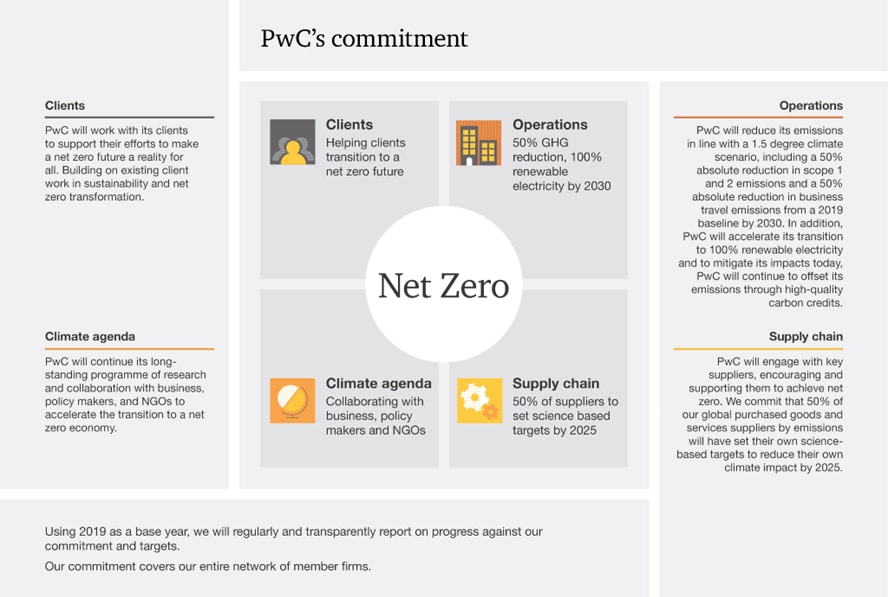Towards tomorrow
A year of sustainability milestones
The universal call to action echoes loudly: the drive to become more sustainable is paramount, and it is through the collective action of the corporate world, the corridors of power, and the wider fabric of society that we can chart the course towards a net zero future.
As a small archipelago situated in the middle of the Mediterranean Sea, Malta’s unique geography poses several significant challenges. Scarce natural resources force heavy reliance on imports, while over-tourism and an ever-increasing population strains ecosystems and culture. Challenges related to waste management, water scarcity, and traffic congestion pose further environmental threats, making climate change vulnerabilities, biodiversity preservation and a shift away from fossil fuels matters of urgent concern. In light of this, the need for businesses to not just evolve, but assume responsibility for the role that they play is key.
At PwC, our approach to sustainability is dynamic, working continuously to adapt to the changing market climate to deliver solutions that drive value and fuel growth, whilst strengthening our environment and societies. This means setting clear targets, creating actionable plans that achieve real results, and collaborating with other organisations in the broader ecosystem to support our net zero transition and bolster our progress towards a more equitable society.
In line with our purpose, we have made a worldwide commitment to achieve net zero greenhouse gas (GHG) emissions with near-term science-based targets set for 2030.

“The urgency of a net zero transition is clear, and it demands our collective action. At PwC, our mission is to not only lead by example but also empower our clients to navigate the intricacies of the path towards a more sustainable future. Working together, we can transform challenges into opportunities and pave the way for businesses to thrive without compromising the opportunities of tomorrow.”
PwC Malta’s Net Zero commitment
PwC has made a worldwide commitment to achieve net zero greenhouse gas (GHG) emissions with 2030 goals. As part of this commitment, the PwC network will work with its clients to support their efforts, contribute to public policy developments in support of net zero and decarbonise our operations and supply chain through Science Based Targets initiative (SBTi)-validated near-term targets. To mitigate its impacts today, PwC will offset its emissions through high-quality carbon credits, transitioning to 100% carbon removals by FY30.
As the Malta firm, our dedication to achieving net zero remains unwavering. Over the past year, we have continued to advance our local net zero action plan by eliminating, reducing, substituting and compensating for our carbon emissions through the purchase of high-quality carbon credits. Through various initiatives, we have already achieved significant reductions in our scope 1, scope 2 and scope 3 Business Travel emissions by 18% compared to our baseline year (FY19).
We also understand that measuring and reporting our net zero progress is about more than just compliance; it serves as a source of inspiration for our stakeholders, be they clients, employees or other market participants. In providing clear and comprehensive reporting on our net zero journey, we aim to set an example for local businesses and organisations to follow suit, fostering a culture of sustainability among key players in the industry. As a result, our approach involves transitioning our operations and supply chain, sharing our expert knowledge with our clients and other organisations, supporting our clients as they navigate the transition to a low-carbon world, and actively engaging in the global and local climate policy debate while advocating for transformative change.

In the past year, our emissions profile has evolved, reflecting both our operations and our commitment to environmental responsibility. Due to our recent acquisition of a local IT company, Megabyte, we have expanded our carbon footprint to include scope 1 emissions, solely attributable to three legacy vehicles that were part of the acquisition. Our scope 2 emissions however continue to represent a significant portion of our carbon footprint: accounting for 48% of our total scope 1, scope 2 and scope 3 Business Travel emissions in FY23.
In line with PwC’s global commitment to reduce scope 1 and 2 absolute emissions by 50% from a 2019 base by 2030, we have continued to take action to pursue mitigating initiatives to improve our environmental impact. In FY22, investment was made to change old HVAC systems and introduce more energy efficient heating and cooling equipment, while at the start of 2023 temperature limits were introduced on all AC units.
Moreover, the implementation of smart controls through a new building management system, and the application of infrared films on windows to reduce heat loss together have allowed us to better monitor and reduce unnecessary waste of electricity. At the same time, we have continued to transition to an all LED lighting office and are seeking to continually upgrade our office space to meet these ambitions. Additionally, the PV installation on the roof of our car park continues to provide us with a constant supply of renewable energy that is consumed entirely by our operations, and therefore contributing positively to our net zero goals.
Given that electricity use, and therefore our scope 2 emissions, are so closely linked to our premises and our people who use the building on a daily basis, it is important to note the recent expansion of our offices and the increase in total headcount. As from the start of FY23, we have expanded our physical footprint and taken on further space in our building. This expansion naturally led to an increase in our occupied floor area, subsequently impacting our electricity consumption. In parallel, the majority of our people have now resumed working from the office, and we have welcomed a growing number of full-time employees, students and interns as the firm continues to expand.
As a result, in the year under review, our total scope 1 and scope 2 emissions have fallen by 25% from our FY19 baseline. We are therefore halfway to achieving our goal of a 50% reduction in absolute scope 1 and scope 2 emissions by 2030.
______________________________________________________________________________________________________________________________________
While actioning scope 1 and 2 emissions is important, a large portion of our emissions fall within our value chain. In revisiting our baseline data, our scope 3 business travel emissions contribute substantially to our overall footprint and accounted for the remaining 52% of our total scope 1, scope 2 and scope 3 Business Travel emissions in FY23.
Business travel emissions include not just air travel from business related flights, but also land based travel (rental cars, expensed fuel, taxis and trains) and overnight accommodation used during business travel. As an island state with no land connection to mainland Europe and significant overseas business, reducing our business travel emissions remains a challenge.
In FY23 we continued to see a significant bounce back in business travel related emissions as operations return to normal. This past year we saw a 6% decrease in business travel emissions from FY22, representing an overall decrease of 12% from our baseline. This was achieved despite a full recovery following the COVID-19 pandemic, an increase in overseas recruitment, and a return of traditional business travel.
As a firm we continue to analyse travel trends with a view to reducing travel emissions to the extent practicable. We acknowledge however, that the journey towards reducing our scope 3 emissions presents unique challenges. The Mediterranean island geography of Malta places a natural dependence on air travel, limiting alternative transport options. Yet, we remain steadfast in our commitment to counterbalancing emissions we have not yet reduced or may find challenging to mitigate.
______________________________________________________________________________________________________________________________________
Another facet of our net zero journey relates to our purchased goods and services where we are working to decarbonise our supply chain. We have plans to engage with key suppliers, encouraging and supporting them to achieve net zero, as we work towards decarbonising our own operations and supply chain, with PwC global committing that 50% of our purchased goods and services suppliers by emissions will have set science-based targets to reduce their own climate impact by FY25.
Given that the majority of our suppliers are local, it remains a considerable challenge to select suppliers that have their own validated SBTi. As a result, in FY23 only 2.5% of our purchased goods and services by greenhouse gas emissions were with suppliers having SBTs.
______________________________________________________________________________________________________________________________________
In light of the above, we have committed to purchasing high-quality carbon credits, transitioning our carbon credit portfolio to 100% carbon removals by FY30, which speaks volumes about our dedication to reducing our environmental impact, even as our business continues to grow.
Starting from this financial year (FY23) we have taken proactive steps to offset energy and mobility emissions, spanning scope 1, 2 and 3 business travel. Our vision extends to FY30 when we will fully transition our portfolio to carbon removals. In this respect, the PwC network runs a global carbon credit purchase process for all member firms, including PwC Malta. This offers a range of credits in terms of project type and location. Notably, EcoAct certified that PwC Malta has successfully offset 555 tonnes of CO2e for FY23, equivalent to all our scope 1, 2 and 3 business travel emissions.
We have also partnered with Climeworks; a direct air capture (DAC) facility in Iceland empowering people and companies to fight global warming by offering carbon dioxide removal as a service via DAC technology. Climeworks’ revolutionary technology greatly aligns with PwC’s New Equation strategy which sees people and technology working hand in hand, thus resulting in a human-led and tech-powered approach. By coming together and supporting players in the net zero ecosystem, we hope that this partnership will help scale up the technologies and solutions we as a globe desperately need.
______________________________________________________________________________________________________________________________________
While net zero addresses our business’s impacts on the environment, the Task Force on Climate-related Financial Disclosures (TCFD) addresses how we are tackling the impacts of climate change on our business.
PwC has taken on a network-wide commitment to voluntary disclosure within the framework established by TCFD; a framework that has rapidly gained recognition as the standard for climate risk reporting, with adoption spanning numerous countries. While it does define a set of climate-related disclosures, TCFD moves far beyond reporting, encouraging business leaders to ensure their organisations adopt proactive measures to adapt and build resilience in the face of climate change.
Within PwC’s TCFD impact framework, we recognise that our business may face climate change impacts on three distinct levels: direct, portfolio and the border market. The assessment we have undertaken however, zeros in on the direct impacts, focusing on the outcomes that directly affect PwC Malta’s operations, services or people.
While most climate hazards fall below the threshold for significant impact, drought stands out as both a current (2020) and future (2050) concern. We have also assessed our sensitivity to these hazards in terms of how they may impact key resources across various aspects, including our offices in Qormi, other PwC facilities, the security and safety of our staff, remote work capabilities, telecommunications and internet infrastructure, power supply, business travel and population migration and access to workforce, identifying which are the most relevant. We noted that heat, precipitation, floods, high winds and wildfires would likely lead to the most disruption to our key business resources. However, these have not been flagged as either current or expected impacts of concern.
As we move forward in our climate risk journey, our next steps involve carrying out an evaluation of current adaptation measures in place to address the impacts of the identified hazards. We will also proactively identify and develop plans for business responses needed to mitigate or adapt to the direct physical impacts identified. Finally, as we understand that collaboration is imperative, we will identify the stakeholders that we believe should be involved to actively engage them in our agenda.
______________________________________________________________________________________________________________________________________

Other initiatives
While our net zero ambition remains the central pillar of our action plan, we are also undertaking many other initiatives. It is our mission to lead by example and use our position and breadth in the market to shape the attitudes of our clients and staff to achieve more responsible business practices. This commitment finds expression not only in our net zero goals and our mitigation measures, but also through a proactive approach to community engagement and education.
As a result, throughout the year we have engaged with our stakeholders in a number of ways to raise our sustainability agenda. We have hosted a series of events aimed at educating our stakeholders on the essence of ESG and sustainability, with the goal of shedding light on why these aspects matter to businesses and how they fit into the broader societal and environmental context, including our work with the Malta Chamber to share knowledge, collaborate and advocate for sustainable practices across the business landscape in Malta, and the launch of the first ESG CPE course, in which we take a deep dive into ESG and its consequences.
We have also worked hard to make our net zero ambition a mission that is not only isolated to the ESG team, but one that encompasses every member of staff. We have therefore organised multiple upskilling and knowledge sharing sessions on our targets, our commitments, our challenges and all that will need to be done to make good on this agenda.
Additionally, our commitment to underpinning sustainability in future leadership development is evident through PwC’s NextGen offerings; designed to empower the next generation of leaders across the globe by equipping them with the knowledge, confidence and leadership skills necessary to tackle the multifaceted challenges of our rapidly changing world. By nurturing the next generation and instilling ESG matters in the general conversation, we ensure a sustainable legacy of responsible environmental business practices and environmental stewardship.
Explore
PwC Malta Annual Review 2023
Contact us














